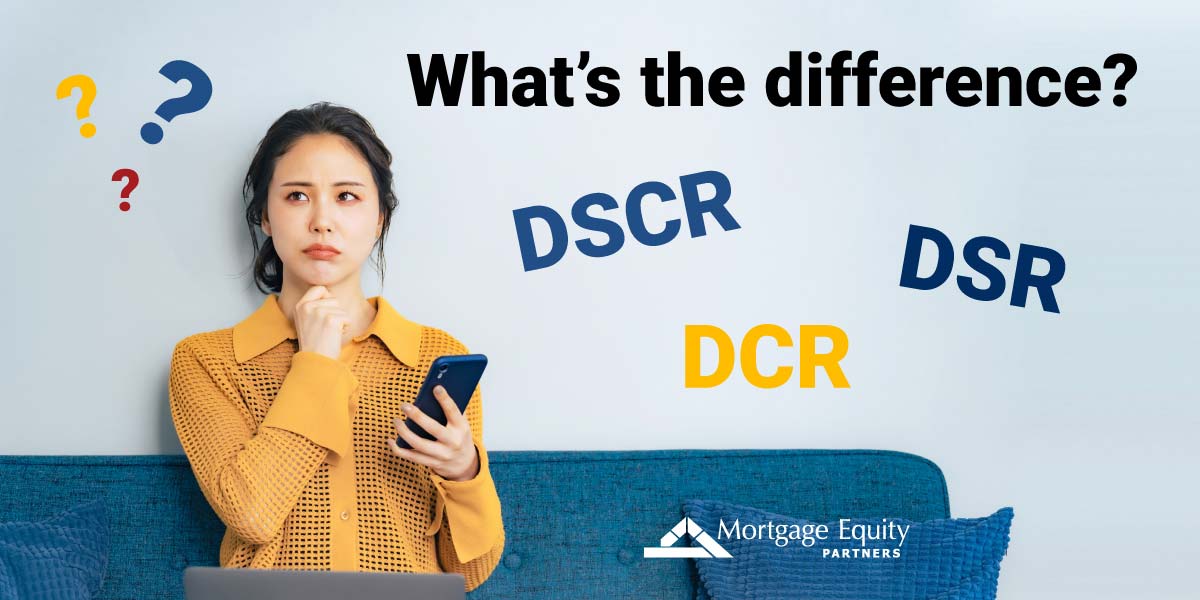
What is the difference between DSCR/DCR/DSR?
These terms are interchangeable. A DSCR is an important term used to measure a property’s ability to cover its debt obligation.
DSCR stands for Debt Service Coverage Ratio
DCR stands for Debt Coverage Ratio
DSR stands for Debt Service Ratio
What is a DSCR loan?
Residential real estate investors use a debt service coverage ratio loan (DSCR) to qualify properties that will generate a return on investment as a short-term or long-term rental property. These loans are also referred to as Investor Cash Flow loans. DSCR/Investor Cash Flow loans are non-qualified mortgage (non-QM) loans designed specifically for residential real estate investors. Unlike conventional loans that rely on personal income and employment information to qualify, DSCR loans allow borrowers to qualify based on a property’s rental income analysis.
A DSCR calculation shows whether a property generates enough income to cover the debts and is a requirement used to determine whether a borrower qualifies for this type of mortgage.
If a property’s net operating income is $100,000 yearly and debt payments total $50,000 yearly, the DSCR is 2.0.
A DSCR over 1.0 indicates the property breaks even.
Another way of calculating the DSCR is by dividing the monthly rental payment by the monthly mortgage debt. The (PITIA) principal, interest, taxes, insurance, and HOA fees, if applicable, are included in the mortgage debt. The ratio is calculated by dividing the expected rental payment by the annual mortgage debt RDP (Rent Divided PITIA=DSCR).
Example: Rent Divided PITIA (RDP)
$1100 Rent / $1000 PITIA = 1.10% DSCR Positive Cash Flow
$1000 Rent / $1000 PITIA = 1.00% DSCR 1 to 1 Break Even
$900 Rent / $1000 PITIA = .90% DSCR Negative Cash Flow
How DSCR loans differ from traditional loans
A traditional conventional loan requires a borrower to show proof of income. Usually, a W2 or tax return, but a DSCR loan allows borrowers to qualify based on the property and its ability to generate cash flow. For investors who cannot qualify for a conventional loan, DSCR loans are a great option. Additionally these loans often close in an LLC and not an individual borrower’s name.
Who uses DSCR loans?
DSCR or Debt-Service Coverage Ratio loans are great for borrowers who are:
- Seasoned or first-time investors
- Self-employed borrowers with multiple businesses
- Entrepreneurs
- Retired People
Sometimes, a first-time investor may also be a first-time homebuyer, but you must discuss that with a qualified loan officer to confirm eligibility.
What is needed to qualify for a DSCR loan?
To qualify for a DSCR, most borrowers will need to demonstrate the ability to repay with a DSCR of 1.0 or higher and have a good credit history. DSCR loans also have a minimum FICO Score and down payment requirement. Your Mortgage Equity Partners loan officer can review the requirements at your initial consultation.
Benefits of using a DSCR loan
DSCR loans use a property’s rental income to qualify borrowers rather than their personal income. This can make it easier for people with lower incomes to qualify and be especially advantageous for self-employed individuals or those with complex income structures.
DSCR loans can have quicker application and closing times than other types of mortgages because they require less documentation and don’t require employment verification.
Investors may qualify for larger loan amounts based on the property’s income potential rather than being capped by personal income limits.
If you are an aspiring real estate investor who wants to start buying investment properties, a DSCR loan may be the best option as you build your real estate portfolio. The main benefit is that you can use the property’s rental income to qualify. If you have questions on this or any of our programs, please get in touch with our experienced loan team to learn more.




